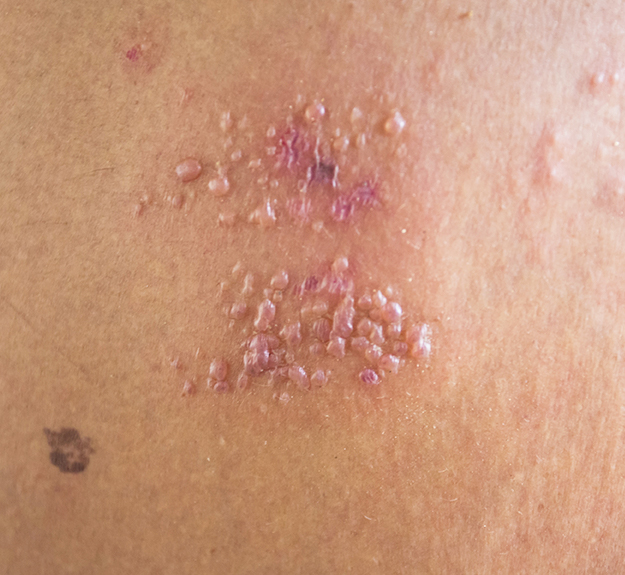GENITAL HERPES

By Dr. Nektarios Logaras – Dermatologist/Venereologist
Herpes simplex virus is the most common cause of sexually transmitted genital ulcers worldwide. Herpes simplex virus is the most common cause of sexually transmitted genital ulcers worldwide.
The infection lasts a lifetime and can be recurrent.
When the virus is not actively multiplying, it still remains in the body in a dormant state.
Genital herpes occurs with painful, recurrent lesions having significant psychological and social burdens to the sufferers.
Herpes is transmitted from mother to newborn during childbirth, resulting in significant morbidity or even death of the newborn.
Early diagnosis is very important; because with the proper treatment, we can reduce the infectivity, the intensity, the extent as well as the duration of the symptoms.
The infection manifests as erythematous papules and blisters with serous or seropurulent fluid, erythema and oedema. In a few days, the blisters break creating painful, itchy sores, with fever, fatigue, muscle pains, and lymphadenopathy. In women, depending on the location, it may cause cervicitis with vaginal discharge and painful intercourse (dyspareunia) while in case of urethritis there is urethral discharge and dysuria (painful urination). Furthermore, if the autonomic nervous plexus that innervates the bladder or anus is affected, the patient will develop urinary retention or difficulty opening the bowel.
Genital herpes caused mainly by the Herpes Simplex Virus Type 2 (HSV-2) and less often by the Herpes Simplex Virus Type 1 (HSV-1). The infections that are caused by HSV-1 and HSV-2 are among the most common viral infections in humans. The HSV-1 and HSV-2 are double-stranded DNA viruses of the Herpesviridae family. In nature, only humans are carriers and get sick and not the animals. The transmission occurs when a person is in close contact with a carrier without necessarily having any clinical symptoms or lesions.

The transmission of HSV-2 occurs mainly through sexual contact while the transmission of HSV-1 is mainly through saliva in childhood, usually causing cold sores.

The virus (HSV-1 or HSV-2) enter into the skin through micro-injuries, and through the cells and sensory neurons end up in the sensory ganglion, where they stay in a latent state for the rest of our life.
The main causes of reactivation are:
-Infection
-Trauma
-Stress
-Exposure to UV radiation
-Menstruation
-Low immune system without any specific aetiology
-Without any known reason
During relapses, the rash without treatment is usually less extensive and shorter in duration (7-10 days). Whereas, in the primary infection, the symptoms such as stinging, burning, pain and itching are more intense and have longer duration and extent. A helpful tip for patients who have been diagnosed with the disease is to always use a condom even between relapses in order to reduce the risk of transmission.
According to the World Health Organization (WHO), the Herpes Simplex Virus 1 and 2 (HSV-1 & HSV-2) or Herpes viruses are more common in developing countries than in developed ones. The highest frequency is recorded in sub-Saharan Africa (70% in women and 55% in men). The lowest frequency is recorded in Europe, 18% in women and 13% in men. In America, it is estimated that 1 in 6 men and women between the ages of 14-49 have genital herpes.
Treatment
The treatment differs between the primary infection and the recurrent infection. In primary infection, the dosage, the type of medication as well as the duration of administration may differ and can be modified, from that of the relapsing infections.
In any case, it is important that in addition to the diagnosis and the appropriate protecting measures (e.g. wear a condom during every sexual intercourse) to administer the appropriate medication in order to reduce the infectivity, to limit the intensity, the extent, and the duration of symptoms.

The Doctor’s experience
Dr. N. Logaras MD
Dermatologist – Venereologist
Laser Dermatologic Surgeon
Graduate of Nottingham and Birmingham Universities of England.
-Specialization in Dermatologic Surgery, Department of Plastic Surgery, Hospital of Dermatological & Venereal Diseases “Andreas Syggros”
-Specialization in Digital Dermoscopy – Mole Mapping, at the Department of Dermoscopy and Melanoma, Hospital of Dermatology & Venereal Diseases “Andreas Syggros”
-Degree in Medicine, Bachelor of Medicine and Bachelor of Surgery, The University of Nottingham, UK.
Postgraduate Training of the American Academy of Dermatology at the Miami Convention Center in Miami, USA, and at the International Center of Lutronic, using Laser Systems for Medical and Cosmetic Applications, in Seoul, South Korea.
ΚΑΡΙΕΡΑ ΚΑΙ ΕΠΑΓΓΕΛΜΑΤΙΚΗ ΕΜΠΕΙΡΙΑ
CAREER AND PROFESSIONAL EXPERIENCE
Dermatologist – Venereologist, Private Clinic – Athens South Dermatology & Laser Center, Alimos
-Dermatology – Venereology Specialty, Hospital of Dermatological & Venereal Diseases “Andreas Syggros”
-Former Doctor, Royal Derby | Derby Teaching Hospitals NHS Foundation Trust, England
-Former Doctor, Taunton and Somerset Hospital NHS Trust-Musgrove Park, England
-Former Doctor, Worthing and Southlands Hospitals NHS Trust, England
-Former Doctor, Queen Alexandra Hospital, England
-Former Doctor, Portsmouth Hospital NHS Trust, England
-Former Doctor, Brighton and Sussex University Hospitals NHS Trust, England
19 years of medical experience
Τηλέφωνο για Ραντεβού: 2109821431







